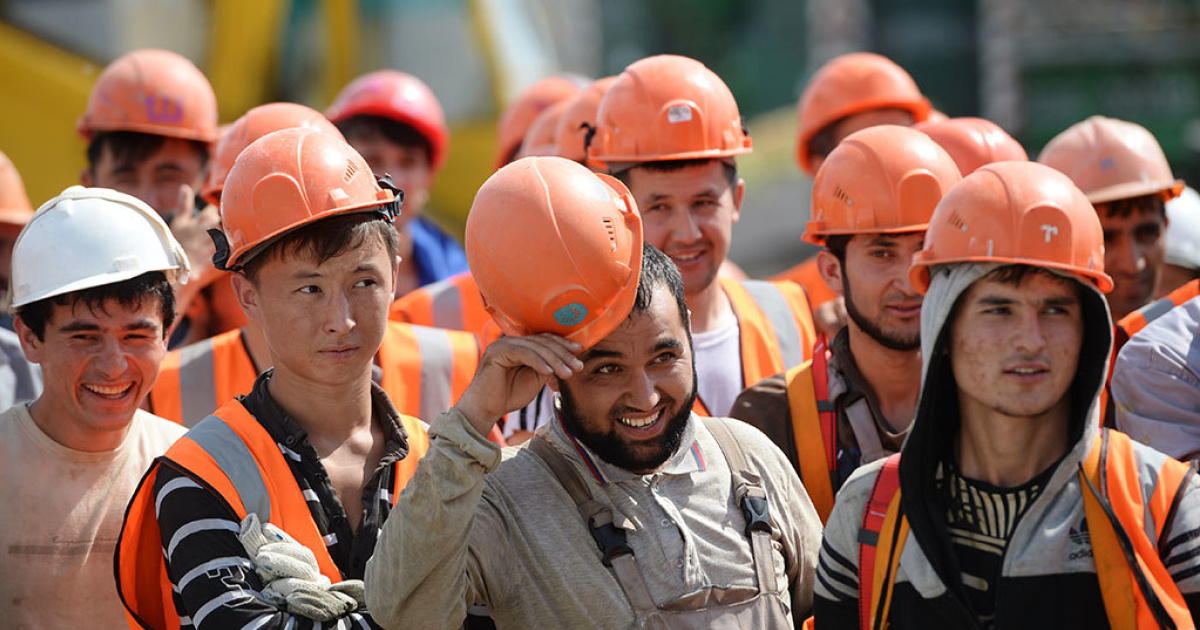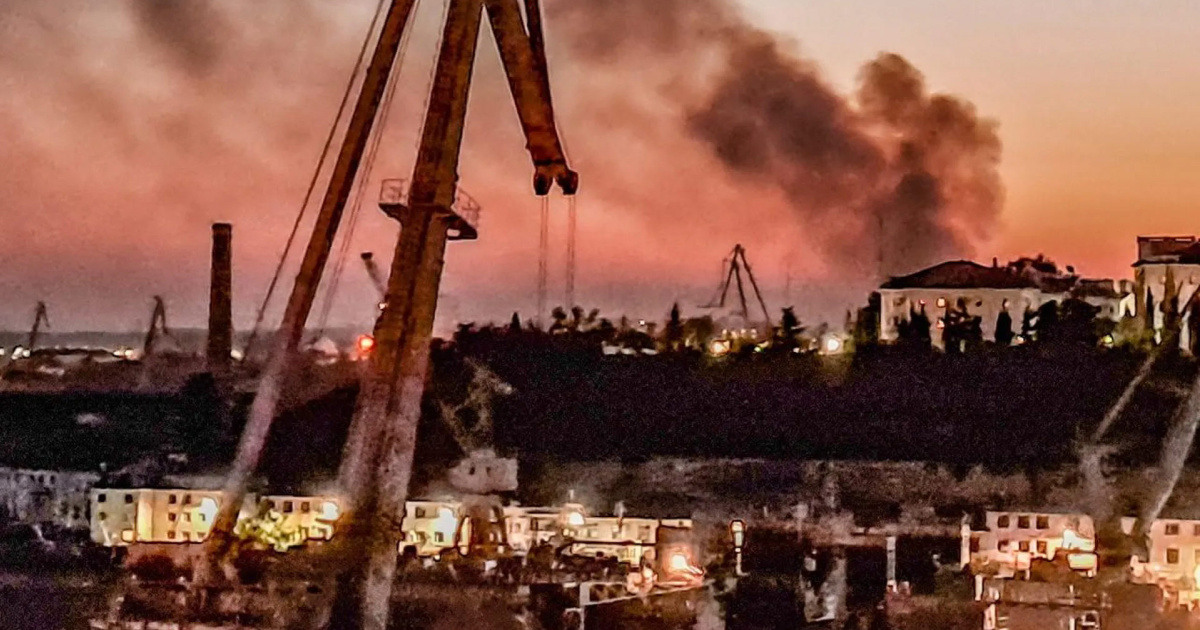"We are still collecting commission fees, — Larysa Veselyanska, a volunteer from the organization Kharkiv Station says, ending the telephone conversation that broke off our interview. "In this modular camp they get drunk, pick fights. Why to settle them like that?"
I had visited this modular camp just the day before I arrived to the Kharkiv Station. It was on Sunday in early October. Several local men sat at the table with security guards and talked about something. Women were engaged in their own household work, children played in the yard. The camp seemed to be in harmony.
But Svitlana Chuprina, the chief of the Kharkivspetsbud communal enterprise, in fact responsible for the order in this territory, was forced to go to work that day. "Four violations per night", — she explained wearily. According to Chuprina, fights and other unpleasant incidents occur in the camp regularly. It is quite natural phenomenon in any apartment building, where completely different neighbors are gathered. But in a closed community of dependent on each other people this is always regarded as something extraordinary.
"The idea was that these modular camps would be just a temporary housing. But it is difficult to evict the people who settled there, because they have nowhere to go. As a result, they created their own little closed environment, not accepted by the locals. In addition, many humanitarian organizations focus on these modular camps. Therefore, those people get all that they need right there. In other words, this is a classical scheme of ghetto formation", — Hryhoriy Selischuk says, the director of Department of humanitarian programs of charitable foundation Caritas Ukraine, which also helps people affected by the war in eastern Ukraine.
Moreover, many displaced persons work in that modular camps, getting paid for their services. It really creates a closed environment.
In January 2017, Kharkiv modular camp celebrated its second "birthday". It is a sad holiday, considering that 90 percent of its residents live there since the first days of its existence. According to the calculations of local authorities. IDPs could stay in this "transit" housing for up to six months. After that, they were supposed to settle in separate houses or apartments. In Germany, from where these modular camp units came, this would mean some kind of social housing.
But in Ukraine, these people have nowhere to move, so the main part of the modular camp has remained unchanged for two years. Most residents are large families, single mothers, disabled people — and often three in one. Few people will rent out an apartment to such families, and hardly any of them will be able to pay for that. According to Svitlana Chuprina, as of October 2016, almost 400 people, half of whom were children, lived in the Kharkiv modular camp.
All roads lead to volunteers
Kharkiv settled the largest number of IDPs among other oblast centers of Ukraine. 190 thousand people registered here, slightly more than 110 thousand were able to confirm their stay. Meanwhile, Station Kharkiv stores data of more than 150 thousand real people who came to the office of the volunteer organization with their problems. Larysa Veselyanska believes that there are much more IDPs from Luhansk and Donetsk in Kharkov than official data show, but not all of them wanted to register as IDPs and not all applied for the help.
Most of the internally displaced people rent apartments or live with their relatives. The authorities of the Kharkiv oblast declare that for those who do not want or cannot leave Kharkiv and cannot pay their rent, there are several other options for resettlement in addition to the modular camps.
In October 2016, I came to one of those addresses specified by the city authorities as a place where IDPs can be temporarily accommodated. This proved to be a building on the edge of Kharkiv, far beyond the modular camp, which itself is believed to be situated in the suburbs. I asked the taxi driver to wait aside for secrecy and went there with the already familiar intention to claim to be an IDP myself, who seeks for shelter. However, in this case, no conspiracy could withstand a collision with reality.
High trellis fence was locked from the inside. Two chronically intoxicated men sat on the curb a few steps away from the fence. "Let me work for you", — one of them suddenly suggested for some reason.
Through the fence bars I asked a woman who swept the yard, with whom I could talk about the temporary residence of a friend’s family, who will come to Kharkiv from Donetsk. I had to rebuild my legend on the go. The stern guard who came at her request refused to let me inside: "I am not a guide". The woman who turned out to be an IDP herself, told me they will not be able to settle a family here: there are only separate beds for a man and a woman available. "What about the child?". — "It is not possible, this is an overnight shelter...". Both eventually advised me to visit 25 Dmytrivska Str...
It turned out that this was the very office of the Station Kharkiv. This is the only address I heard in the city when I pretended to be an IDP: everybody sent me to 25 Dmytrivska Str. "One Kharkiv resident gave us his office on the first floor. We can accommodate up to 50 people there. We made a clean hostel there with a kitchen, bathroom, shower, washing machines. The people who were left in the street call the Emergency Ministry and it directs them to us... ", — Larysa Veselyanska said.
The authorities are silent
In winter of 2016, the government dramatically changed the conditions for getting of pensions and social benefits by the IDPs. The ministry and the migration service had a dispute over a stamp in the "IDP certificate", in which the IDPs themselves were involuntary intermediaries. The migration service, relying on the new regulatory documents, refused to put the previous stamps in the new certificates, without which it is impossible to receive pensions and social benefits. Local social protection departments refused to accept certificates without stamps, referring to the guidelines of the Ministry of Social Policy. In addition, social protection departments were required to check the actual residence of the internally displaced persons at the addresses indicated by them.
At the same time, the SBU has announced a certain list of "pseudo IDPs" — people who are actually living in the territories not controlled by Ukraine. The shock affected even those who simply changed the place of residence, not registering their new address, because even a simple re-registration led to the suspension of payments for some time. But what is even worse — these lists somehow contained people who did not even go to the uncontrolled territories and did not change their address after the registration.
In a few weeks, tens of thousands of IDPs were left without shelter, for which they could no longer pay, and without any means at all. Hundreds of desperate people came to the Station Kharkiv once again.
Larysa Veselyanska recalls this period with pain: "A 70 year old couple came here for 70 years, they did not go anywhere from Kharkiv. They said: "We even called our ambulance, we were in the hospital". They blocked pensions and benefits for them, the old couple was threwn out of the room they rented. They left bags at the railway station and came here: "Please give us money, we will go home...".
Since the summer, the situation has more or less stabilized, but internally displaced persons continue to live in fear, waiting for new unpleasant surprises from Kyiv. International organizations and donors involved in assistance for IDPs have moved on from emergency to more solid and long-term projects. It is no longer a question of "transit" housing such as modular camps. The amount of humanitarian aid and assistance in obtaining temporary housing also traced a tendency towards the reduction or — as in the case of temporary housing — was stopped in fact. Today's major projects are connected, first of all, with the integration of internally displaced persons into host communities by means of professional retraining, businesses support and development of social infrastructure on the territory of such communities.
But the main obstacle to any integration of IDPs remains chronically unresolved — their lack of permanent housing. Over 300 displaced persons began to move out of Romashka private camp near Kharkiv, which was hastily reequipped into the temporary housing for IDPs in 2014, just from March. The camp owners kept it at the expense of donors and their own money for three years. They cannot do it anymore. The residents were humanely given several months to find new housing.
People involved in projects on assistance to internally displaced persons observe the decrease in activity of international donors because of the passivity of the Ukrainian authorities themselves with the key problems of IDPs, who stay on the sidelines of politics for all three years of the conflict continuation. The authorities, both central and local, prefer just to take a back seat.
OstroV sent an official request to the Regional Administration and the Regional and City Councils of Kharkiv on March 14 with a request to inform about the working lifespan of modular camp and whether they have a plan for further resettlement of the IDPs living there, many of whom cannot do without outside help. The Regional Council and the Regional State Administration forwarded the requests to the City Council. Kharkiv sent an actual rejection to provide such information. OstroV contacted the office of the Verkhovna Rada Commissioner for Human Rights on March 21 with a complaint about violation of the Public Access to Information Act by the Kharkiv City Council.
Coincidentally, the authorities of the city solve another problem connected with the modular camp and people living there just about the time. Football gate on sports ground near the town fell to a 13-year-old goalkeeper during a strong wind in early March, the guy was killed. The administration is busy searching for the guilty: the city authorities state that the gate were put by GIZ German state agency on the morrow of the modular camp — the German part insisted that it was the work of Kharkiv city crews…
GIZ, in turn, also do not talk about the deadline of working lifespan of the houses given by them, just noting that it can be different depending on the conditions of their use. At the same time, the agency reports that they are financing a number of infrastructure projects related to the needs of IDPs in Kharkiv, Dnipropetrovsk and Zaporizhia oblasts at the present time, including 8 accommodation facilities, such as hostels, social hotels, nursing homes for the elderly, etc. GIZ also intends to delegate consultants who will create strategies for resettlement of internally displaced people living in modular camps together with local authorities.
Pinpoint projects on repairing or reconstructing hostels for resettlement of internally displaced persons solve the problem of dozens of people to some extent, when hundreds of thousands left without a home. Furthermore, areas of compact settlement, as in the case with modular camps, contribute little to the psychological and social adaptation of people who have experienced serious trauma.
Modern times
Kharkiv Station insists that preferential credits for the construction or purchase of housing would be the best solution. This would at least facilitate the government's task on resettlement of IDPs: by sending some "free floating" with minimal budgetary support, it could purposefully solve the problems of others — those who are not able to afford themselves a considerable credit under any circumstances. A program with temporary accommodation in hostels and allocation of apartments in new buildings could be run for such people by order of their appointments on the ground of clearly defined criteria, as it operates in Georgia. It is unlikely that such a resettlement would be possible soon, but this would be something, definitely better than today's "nothing".
The state Oschadbank announced a program on concessional lending to IDPs in March: up to 90 percent of the cost of credit, for 30 years, at an annual interest rate of 20 percent. It is highly likely that the very few could avail of such terms.
"Vlasny Dim" program on preferential lending of the housing construction in villages and small towns, which operates in the regions and is financed partly from the central and partly from the regional and district budgets, looks outwardly much more realistic. The majority of Regional State Administrations mentioned namely this program in their responses to OstroV's requests for programs on the resettlement of IDPs in the regions, as it is intended for internally displaced persons in particular. However, just one oblast, Chernihiv, reported at that time, in July 2016, that the credit for "vlasny dim" was received by IDPs. Three people… Khmelnytskyi Regional State Administration reported that displaced persons must obtain permanent registration in the relevant territorial community in order to take advantage of preferential terms of this program.
At the same time, Fourth Estate Rivne investigative journalism portal found in July 2016 by the example of one oblast, Volyn, that ordinary villagers simply do not know about "Vlasny dim", and the procedure of obtaining a credit at preferential rate is bureaucratized and non-transparent — in the Volyn region at least.
The Deputy Minister for temporarily occupied territories Heorgiy Tuka also has a few months talking about the state credit from KfW German governmental bank, which is intended for the construction of social housing and concessional lending for internally displaced residents. But there are only talks for now. But it gives at least the reason to hope that 2017 will finally bring specific changes in the provision of IDPs with a full-fledged housing.
The majority of internally displaced persons really consider a credit at preferential rate option for themselves. And in fact, this is not necessarily the expensive housing in or around the capital. Larysa Veselyanska says that many of the wards of Kharkiv Station want and can live in small towns or villages, because they left not the regional centers. Kharkiv volunteers developed their project on adaptation of IDPs in the oblast.
"All these dots, — Larysa points to a map hanging in the office, dotted with notices, — "this is where we go". We go to the oblast every day. Somewhere we are received, somewhere we are waited, somewhere local authorities talk with us, somewhere they are like-minded. The head of the council In Sinne village himself offered housing to displaced persons for title in exchange for the fact that families who will work come to him. But it is not so everywhere. I spoke with the heads of village councils: they have free houses, but they needed to be invested a lot of money, but people do not have money…".
"We have connected the Union of Farmers to our project, — she continues. — Farmers are ready to share their experience and connections, because there is a very high demand for organic farming. We want this to be something that would enable us to live and develop. So it is necessary to specify the expected results. First and foremost, this is the development of the district, because it is possible to gather, evaluate our resources and invest it, isn't it?"
Neither the Ukrainian state nor the existing system of donor assistance contributes today to the use of knowledge and possibilities of internally displaced persons, "among whom there are many highly educated, highly proficient, active and enterprising people", — Hryhoriy Selischuk from Caritas states.
And this no longer has an excuse. The time of making quick and wrong decisions passed together with panic of the first two years of the war, it is time to make meaningful decisions. Adaptation and integration of IDPs using all their huge potential can be inscribed in regional development projects, to which the state annually allocates millions: $334 million in total is provided for 2017 (the State Fund for Regional Development, a subvention for the social and economic development of certain territories, a subvention for the formation of infrastructure of the united communities). And this is already the task that is decided not so much by Kyiv as by the local authorities.
Yuliia Abibok, OstroV




